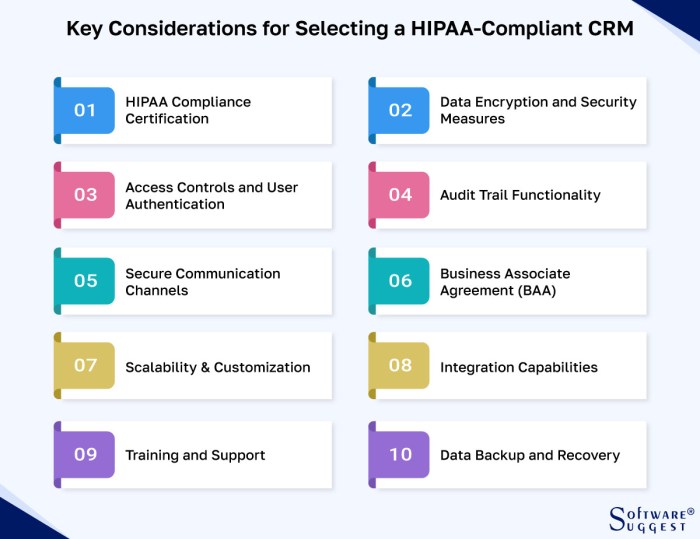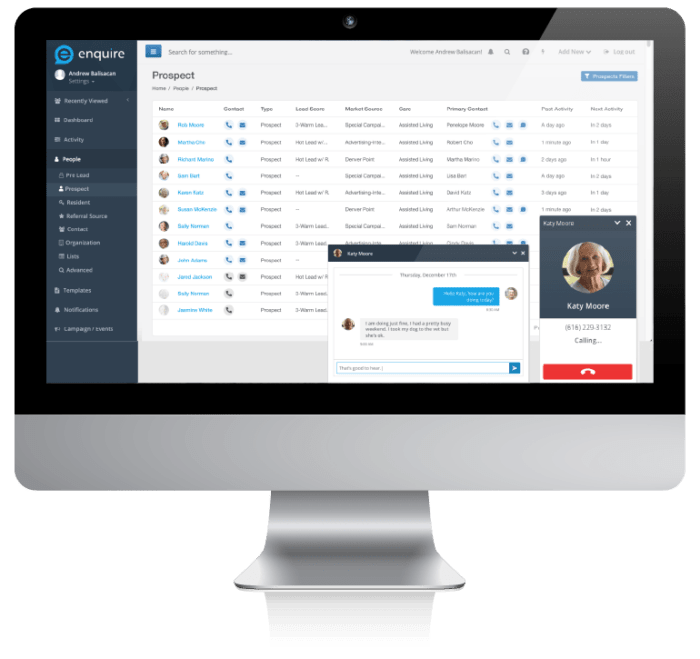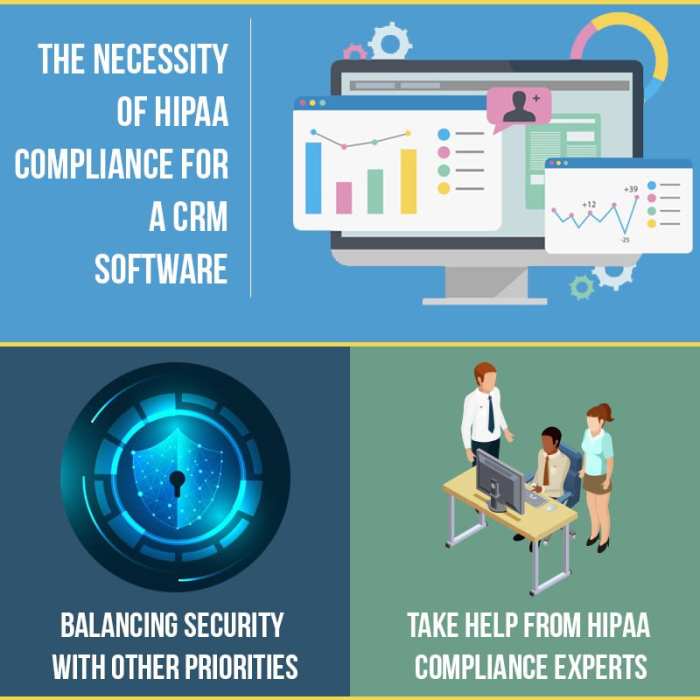Crm software hipaa compliant – In today’s healthcare landscape, safeguarding patient data is paramount. The Health Insurance Portability and Accountability Act of 1996 (HIPAA) sets stringent regulations to protect the privacy and security of Protected Health Information (PHI). For healthcare providers and organizations managing patient data, choosing the right Customer Relationship Management (CRM) software is crucial. This guide delves into the intricacies of HIPAA compliant CRM software, offering a detailed understanding of its features, selection process, and implications for your practice.
Understanding HIPAA Compliance and its Relevance to CRM
HIPAA compliance isn’t just a box to tick; it’s a fundamental responsibility. The act mandates specific security measures to protect electronic Protected Health Information (ePHI), including patient names, addresses, medical records, and insurance details. A non-compliant CRM system can lead to hefty fines, legal repercussions, and irreparable damage to your reputation. Therefore, selecting a HIPAA compliant CRM is not an option, but a necessity.

Source: softwaresuggest.com
Key HIPAA Requirements for CRM Software
- Administrative Safeguards: These include policies and procedures for data access, employee training on HIPAA compliance, and risk assessment and management. Your CRM provider should demonstrate robust administrative controls.
- Physical Safeguards: This focuses on securing the physical location where ePHI is stored and processed. Cloud-based CRM solutions often handle this aspect, but you need to verify the provider’s data center security measures.
- Technical Safeguards: This is where your CRM’s technical capabilities come into play. Features like access controls, audit trails, encryption (both in transit and at rest), and data integrity mechanisms are vital. Look for solutions with robust authentication methods and strong password policies.
Choosing a HIPAA Compliant CRM: Key Considerations
Selecting a HIPAA compliant CRM requires meticulous evaluation. Don’t solely rely on vendor claims; conduct thorough due diligence.

Source: jotform.com
Essential Features of a HIPAA Compliant CRM
- Data Encryption: Both data in transit (during transmission) and data at rest (when stored) must be encrypted using industry-standard algorithms.
- Access Control: The system should allow granular control over who can access what data, ensuring only authorized personnel can view or modify sensitive information. Role-based access control (RBAC) is a valuable feature.
- Audit Trails: A detailed audit trail tracks all activities within the system, providing a record of data access, modifications, and deletions. This is crucial for compliance audits.
- Business Associate Agreements (BAAs): Ensure your CRM provider offers a Business Associate Agreement. This legally binding contract Artikels the responsibilities of both parties in protecting PHI.
- Data Backup and Disaster Recovery: Robust backup and disaster recovery plans are essential to ensure data availability in case of system failures or unforeseen events.
- Compliance Certifications: Look for vendors with relevant certifications, such as SOC 2 Type II, ISO 27001, or HITRUST CSF certifications, demonstrating their commitment to security and compliance.
- Regular Security Updates and Patches: The software should receive regular updates to address security vulnerabilities and maintain compliance with evolving standards.
Questions to Ask Your CRM Vendor
- What security measures are in place to protect PHI?
- Do you have a Business Associate Agreement (BAA)?
- What certifications do you hold related to data security and HIPAA compliance?
- What is your data backup and disaster recovery plan?
- How do you handle security incidents and breaches?
- What training do you provide on HIPAA compliance?
- What is your process for regular security updates and patching?
- Where are your data centers located, and what security measures are in place for those facilities?
Top HIPAA Compliant CRM Software Options (Note: This is not an exhaustive list and specific features vary; always conduct your own research)
Several CRM vendors offer HIPAA compliant solutions. Researching each option thoroughly is crucial before making a decision. Consider factors like pricing, features, scalability, and user-friendliness.
Frequently Asked Questions (FAQs)
What is ePHI?
ePHI stands for electronic Protected Health Information. It encompasses any individually identifiable health information stored or transmitted electronically.
What are the penalties for HIPAA violations?
Penalties for HIPAA violations can range from significant fines to criminal charges, depending on the severity and intent of the violation.
Can I use any CRM and just add security features myself?
No. Simply adding security features to a non-HIPAA compliant CRM is unlikely to achieve true compliance. You need a system designed from the ground up with security and compliance in mind.
How often should I review my CRM’s HIPAA compliance?
Regular reviews are essential. At minimum, annually, and more frequently if there are significant changes to your systems or regulations.
What is a Business Associate Agreement (BAA)?, Crm software hipaa compliant
A BAA is a contract between a covered entity (healthcare provider) and a business associate (like your CRM vendor) that Artikels their responsibilities in protecting PHI.
Conclusion
Choosing a HIPAA compliant CRM is a critical step in protecting patient data and ensuring compliance. By carefully considering the factors Artikeld above and conducting thorough due diligence, healthcare providers can select a solution that meets their needs while adhering to the stringent requirements of HIPAA. Remember, the cost of non-compliance far outweighs the investment in a secure and compliant CRM system.
References
- U.S. Department of Health & Human Services (HHS) HIPAA Website
- National Institute of Standards and Technology (NIST)
Call to Action
Protect your patients’ data and your practice’s reputation. Start your search for a HIPAA compliant CRM today! Contact us to discuss your specific needs and find the perfect solution for your healthcare organization.
Quick FAQs: Crm Software Hipaa Compliant
What specific security features should I look for in a HIPAA-compliant CRM?
Look for features like data encryption both in transit and at rest, robust access controls with role-based permissions, audit trails for tracking data access, and business associate agreements (BAAs) ensuring vendor compliance.
How much does HIPAA-compliant CRM software typically cost?
Pricing varies widely depending on the vendor, features, and number of users. Expect a range from monthly subscription fees to larger upfront investments for enterprise-level solutions. Request detailed pricing information from potential vendors.
Can I use a standard CRM and simply add HIPAA compliance features later?
While some CRMs offer add-on features, building HIPAA compliance from the ground up is generally more secure and reliable. It’s advisable to select a CRM specifically designed and certified for HIPAA compliance from the outset.

Source: crmsolutionsusa.com
What are the penalties for non-compliance with HIPAA regulations?
Penalties for HIPAA violations can be severe, ranging from financial penalties (per violation) to legal action and reputational damage. The severity depends on the nature and extent of the violation.
